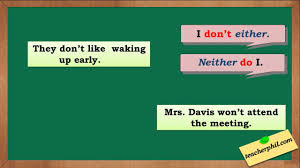
Neither/Either
Neither is used to show agreement with negative statements.
Neither + Auxiliary + Subject (pronoun)
The Auxiliary needs to agree with the verb tense in the original statement.
It is similar to using either at the end of a sentence, although Neither is more commonly used, especially in spoken English.
A: I don’t understand Spanish.
B: Neither do I. (= I don’t understand Spanish either.)
A: I cannot swim.
B: Neither can I. (= I can’t swim either.)
Sometimes people respond Me Neither instead of Neither + Auxiliary + Subject though this is very informal spoken English.
| PERSON A | PERSON B | |
| I am not hungry. | Neither am I. | = I’m not hungry either. |
| I‘m not going to quit. | Neither am I. | = I’m not going to quit either. |
| They don’t speak French. | Neither do I. | = I don’t speak French either. |
Neither and either are used to agree with negative statements (said by Person A)
Neither + Auxiliary (or be/have) + subject
The auxiliary verb or verb ‘to be’ or ‘to have’ needs to agree with the verb tense in the original statement (by Person A)
Neither as a determiner
Neither allows us to make a negative statement about two people or things at the same time. Neither goes before singular countable nouns. We use it to say ‘not either’ in relation to two things.
- Neither parent came to meet the teacher.
- Neither dress fitted her.
We use neither of before pronouns and plural countable nouns.
- Neither of us went to the concert.
- Neither of the birthday cards was suitable.
Spoken English:
In formal styles, we use neither of with a singular verb when it is the subject. However, in informal speaking, people often use plural verbs:
- Neither of my best friends was (formal)
- Neither of them were interested in going to university. (informal)
In speaking, we can use neither on its own in replies when we are referring to two things that have already been mentioned:
A: Mike, which would you prefer, tea or coffee?
B: Neither thanks. I’ve just had a coffee.
Neither … nor
We can use neither as a conjunction with nor. It connects two or more negative alternatives. This can sound formal in speaking:
- Neither Brian nor his wife mentioned anything about moving house.
- Neither Italy nor France got to the quarter finals last year.
The less formal alternative is to use and … not … either:
- Italy didn’t get to the quarter finals last year and France didn’t either.
Not with neither and nor
When a clause with neither or nor is used after a negative clause, we invert the subject and the verb after neither and nor:
- He hadn’t done any homework, neither had he brought any of his books to class.
- We didn’t get to see the castle, nor did we see the cathedral.
Neither do I, Nor can she
We use neither and nor + auxiliary/modal verb + subject to mean ‘also not’:
A: I hate snakes. I can’t even look at a picture of a snake.
B: Neither can I.
Not: I can’t also.
A: Jacqueline doesn’t drive.
B: Nor does Gina.
Not: Gina doesn’t also.
Not … either
We can use not … either to mean ‘also not’, but we do not change the word order of the auxiliary or modal verb and subject:
A: I haven’t ever tasted caviar.
B: I haven’t either. (or Neither have I./Nor have I.)
A: I didn’t see Lesley at the concert.
B: I didn’t either. (or Neither did I./Nor did I.)
In informal speaking, we often say me neither:
A: I can’t smell anything.
B: Me neither. (or I can’t either.)
Typical errors
We use neither, not none, when we are talking about two people or things:
- Books and television are different. Neither of them should replace the other. Not: None of them. We don’t normally use both (of) + not to make a negative statement about two people or things:i.e. Neither of these shirts is/are dry yet. Not: Both of these shirts aren’t dry yet.
Be careful to spell neither correctly: not ‘niether’ or ‘neighter’